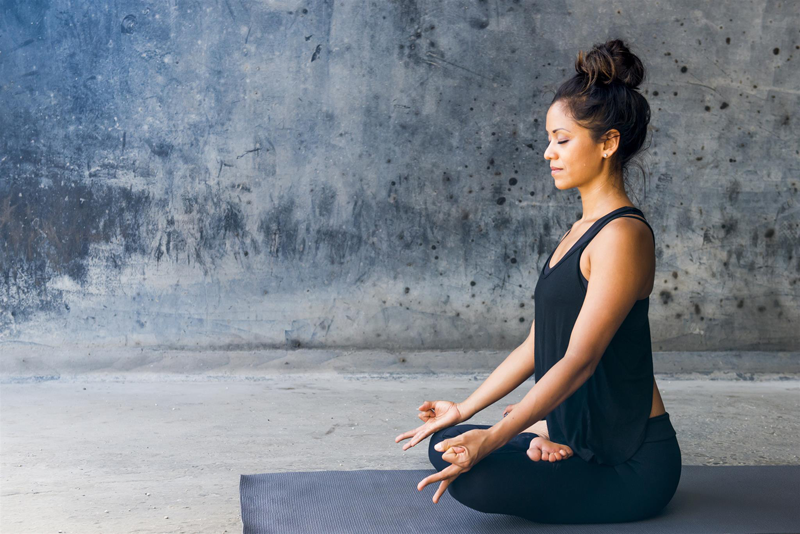If you have ever seen yoga portrayed on TV, then you are sure to have seen the class in the Lotus pose. This is the most recognisable position – pretty much iconic. Padmasana, with Padma meaning lotus and asana meaning pose, is given this name as the legs are meant to resemble the flower when fully opened.
Even though people believe this is the pose all yogis do, it is actually an advanced pose. This pose requires preparation of the hips even for those who have practised yoga for a long time. If you are new to yoga and are setting up to meditate, then there are easier variations and modifications to the pose to help establish your practise.
The benefits of this pose
This is a pose to benefit the body and the mind. Known as the destroyer of diseases, ancient texts say this pose awakens the kundalini, which is the divine cosmic energy that helps bring forth self-realisation. This makes the lotus pose the perfect accompaniment to meditation. If you chant Om mani padme hum, or hail to the jewel of the lotus, during meditation and it is though that this pose will purify and liberate. It will unite the mind, the body, and the spirit.
If you wish to look to the body, then lotus pose has many benefits. It stretches the knees, ankles, and hips. It also strengthens the spine and upper back. If you are someone that suffers discomfort during menstruation, then this pose helps, as it sends more blood to the pelvis area and lower back.
But, ultimately, this is a pose that promotes grounding and stabilisation. It is the perfect pose to use to prepare for meditation and for meditation practice.
Instructions
- Begin in seated staff pose, with your legs extended in front of you and your spine straight. Rest your arms by your side.
- Hug your right knee to the chest. Bring your ankle to your left hip, with your sole facing the sky. The top of you foot should rest again the bend in your hip joint.
- Now, bend your left knee and cross your left ankle over your right shin. The sole of your left foot should also face upwards. The top of the foot will be resting against the hip.
- To strengthen the pose, draw your knees as close together as possible and press your groin towards the floor. You should be sat straight.
- Rest your hands on your knees, with palms facing upwards. You may wish to make a circle with your forefinger and thumb.
- Soften the gaze and hold for up to one minute. You may wish to hold for the duration of your meditation.
- Exit the pose slowly. You should return to seated staff pose. Repeat with the other leg lifted to the body first.
Tips
This pose puts extreme demand on the joints, particularly the hips. It is therefore important to undertake preparation poses and stretches, so that the body welcomes the pose. To achieve full lotus your thigh must rotate externally in the hip sockets – with a flex to 90 degrees. You will also need to deeply flex the knees, whilst activating the strength in your ankles and feet to promote stability. It may be that you do not have enough rotation in the hips to achieve full lotus, not everybody does. This means you should slowly build up to full lotus and work with the abilities of your body.
You should really avoid the pose if you have had a recent injury to the knee, or struggle with chronic problems in this area – as well as the ankles and hips. As this pose takes a good deal of flexibility, it is important to make first attempts at the pose under the guidance of an instructor.
Modifications and Variations
Rather than modifying the pose, it is best to undertake other poses that will prepare the body for the full lotus. For instance, you should prepare your hips with the standing forward bend. You can then work to shift your weight between feet and turning each heel to 45 degrees in turn. Press through the mounds of all the toes and the inner and outer heels. This will help the feet prepare too.
You may also wish to try bound angle pose. Here open out the inner thighs, activating the rotation in your hips. Bend your knees, placing the soles of your feet together. Staying in this pose will prepare the hips and knees for the lotus pose. However, you may wish to inhale, elongate the spine, exhale and then fold forward at the hips. If you can, place your forehead on the floor in front of you.
To perfect the pose
To begin with, it is important to note that if you are straining or forcing your body in anyway, then you need to retreat from the pose. The path to perfecting the pose comes with a gentle easing of the body into position by increased flexibility and rotation. This comes with practice and gradual progression. At any point you can return to easy pose and know that you have gained something from this steady journey towards the lotus pose. Achieving the pose is not the point. Moving towards being able to achieve the pose is what will bring the sense of self-realisation that is at the heart of this pose.
Only with self-realisation, with an acceptance of what can be achieved in this present, can you hope to bloom like a lotus flower.
Once you have sat in lotus pose for the period of your meditation, sit quietly and reflect peacefully on the efforts you have made. With time you will feel a sense of wholeness and completeness in this moment and that you are just as you are mean to be.

